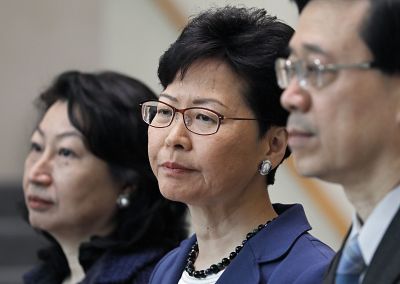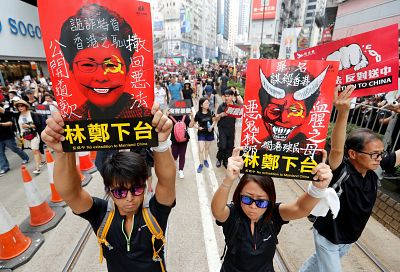Analysis: The huge marches seen in Hong Kong are part of a wider movement to push back against authoritarian Chinese control.
The protesters may have won this round, but the fight is far from over.The mass demonstration thatflooded downtown Hong Kong Sunday — the latest in a string of protests over a proposed new extradition law — are an omen for the coming years and even decades, experts say.Organizers claim 2 million people took to the streets against a proposed law that would allow suspected criminals to be extradited from Hong Kong to mainland China. Police said 338,000 protesters followed the protest's original route, but in any case the island's citizens are pushing back in numbers against what they see as attempts to infringe their rights.And it worked: A day before the march, in an attempt to dampen local anger, Carrie Lam, Hong Kong's chief executive, formally apologized and announced legislative debates surrounding the bill would be suspended, although not cancelled.Ultimately it marked a huge symbolic victory. But the protesters weren't satisfied and are still calling for Lam's resignation and the bill's official withdrawal.So what happens now for Hong Kongers fighting for greater democracy and human rights guarantees?
The past week has illuminated the delicate dance between the government in Beijing and Hong Kong, a former British colony that is now a freewheeling capitalist hub with its own laws and financial system.Under its strongman president Xi Jinping, China has sought to erode Hong Kong's freedoms and tighten its grip on the city, critics say. However, these mass displays of people power are a clear sign that the Beijing government won't be able to do so without considerable resistance."These confrontations are inevitable," says Patricia M. Thornton, an associate professor of Chinese politics at the University of Oxford. "What we saw in Hong Kong, which really is an incredible display of people power, is probably a harbinger of things to come."Former Hong Kong legislator Lee Cheuk-yan told the AP that the activists' mission has become a long-term not a daily struggle. "So if Carrie Lam does not respond to the five demands by the protesters, people will come back and the struggle will continue."
In the short term, the protests appear a significant blow for Xi.Since coming to power in 2013, the president has drastically consolidated his personal power and enforced a harsh crackdown on his political opponents that "harked back to the darkest days of post-Tiananmen China," according to Amnesty International.More recently however, he has encountered several key problems: his ongoing trade war with President Donald Trump, worries that the Belt and Road global infrastructure project may become a debt trap, and the international push-back over the technology company Huawei."It will be another source of pressure for him, if we take what has happened in Hong Kong in the broader constellation of some of the unanticipated results he's been facing," said Thornton, the Oxford professor. "This is a pretty serious challenge for Xi Jinping."So cautious is Hong Kong and Beijing's approach to dealing with protesters that the island's police announced on Monday that it had detained just five people in connection with the march and said it respected people's right to protest.
Also on Monday, 22-year-old activist Joshua Wong, a figurehead of the protest movement,was released from prison. He immediately called for Carrie Lam to stand down.Although there is no evidence that the Chinese president was the driving force behind the controversial Hong Kong extradition law, several members of his Politburo supported it and it's certain Beijing would have approved its passage, according to Tim Summers, a senior consulting fellow at Chatham House, a London-based think tank.He says it's more likely that it was the work of the pro-Communist Party government in Hong Kong — a botched move that will make similar legislation more difficult in future."It's been a singularly unsuccessful attempt. The outcome has been that people power, if you want to call it that, has won through on this issue," Summers said."This makes it much more difficult for the government's bring anything politically sensitive forward for legislation," he added. "The push-back in the protests being so strong on this issue, they will be extremely nervous and extremely cautious about doing that."Supporters of the law within China say it's necessary to stop Hong Kong from becoming a haven for fugitives. But many Hong Kongers worry it risks the city being drawn into Beijing's murky legal system, which is rife with abuses and is used to silence political opponents and activists, rights groups say.
Britain handed over Hong Kong to China in 1997 on the understanding that it would retain relative freedom for at least 50 years.It's too early to tell what Hong Kong will look like after 2047, but many of the last week's demonstrators fear it will spell the end of their special status.Others see the extradition law as part of China's increasing attempts to reel in Hong Kong ahead of time, following the central government's refusal to implement democratic reforms, and its alleged abduction of five dissident booksellers from the city.Summers believes it's unlikely Beijing has concrete plans for an event still 28 years in the future. The official handover documents and accompanying statements suggest that the default position will be Hong Kong staying the way it is, rather than some drastic and sudden change, he says.However, what that status quo actually looks like will "probably depend a lot on what has happened between now and 2047, both in China and in Hong Kong," he said. "There's everything to play for here, I think, as far as 2047 is concerned."













